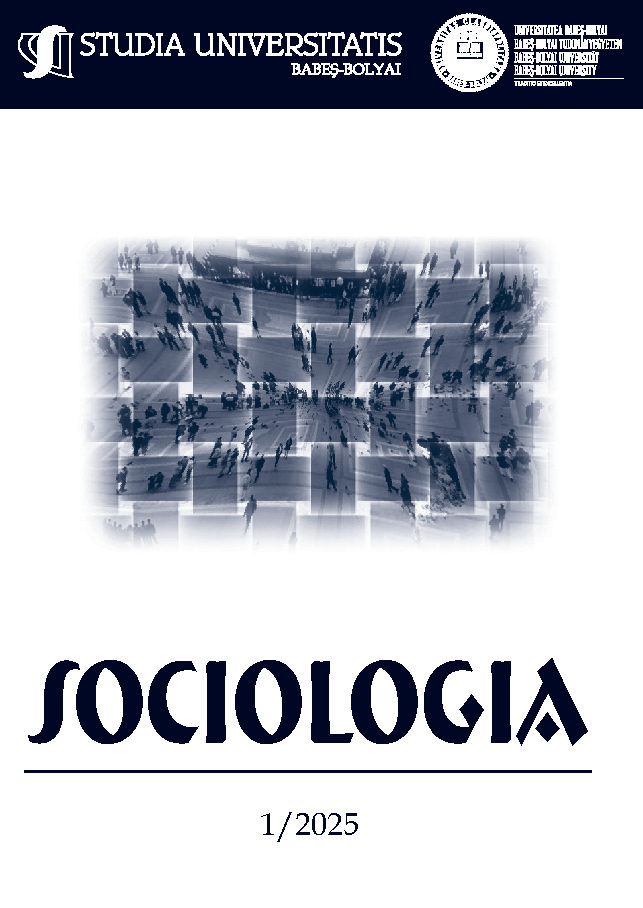FOUCAULT AND GOFFMAN. THE SHADOW AND THE MATTER OF DISCIPLINE IN THE UNIVERSE OF A PSYCHIATRIC INSTITUTION
DOI:
https://doi.org/10.2478/subbs-2025-0005Keywords:
Foucault, Goffman, power, discipline, psychiatric institution, ethnography, surveillance, normalizationAbstract
This paper focuses on the mechanisms of power and discipline that exist within a psychiatric institution in Transylvania, Romania. This is done through combining the theoretical perspectives of Michel Foucault and of Erving Goffman. While Foucault looks at power as the result of internalization through disciplinary mechanisms and discourses, Goffman puts emphasis on the micro-interactions and spatial arrangement that shape the institution. By bringing these two lines of thought together, this study tries to construct an analytical tool that reveals how surveillance, normalization and hierarchization operate concomitantly at structural and interpersonal levels. Using qualitative methods, more precisely participant observation, formal and informal interviews, the research explores patients’ daily lives, the dynamics between individuals (be it staff or patient), the regulation of space and the interdependence of written and unwritten rules. It is suggested that institutional power is exercised not only through correction or direct surveillance but also through strategies and those strategies are built around visibility, divestment of space, documentation and collective self-monitoring. This, in turn, generates docile but truncated forms of subjectivity. The study also highlights the continuous existence of disciplinary strategies despite there being ongoing processes of deinstitutionalization, therefore showing how this psychiatric institution creates regulated, individualized and hierarchized existences.
References
Bratich, J. (2024). Observation in a Surveilled World. In N. K. Denzin, Y. S. Lincoln, M. D. Giardina, & G. S. Cannella (Eds.), The Sage Handbook of Qualitative Research (6th ed., pp. 573–603). Sage Publications.
Burns, T. (1992). Erving Goffman. Routledge.
Chow, W. S., & Priebe, S. (2013). Understanding psychiatric institutionalization: A conceptual review. BMC Psychiatry, 13. https://doi.org/10.1186/1471-244X-13-169
Flick, U. (2024). Triangulation. In N. K. Denzin, Y. S. Lincoln, M. D. Giardina, & G. S. Canella (Eds.), The Sage Handbook of Qualitative Research (6th ed., pp. 1277–1307). Sage Publications.
Foucault, M. (2002). Anormalii. Cursuri ținute la Collège de France 1974-1975 (D. R. Stănescu, Trans.). Univers.
Foucault, M. (2005). A supraveghea si a pedepsi (B. Ghiu, Trans.). Paralela 45.
Garner, R., & Hancock, B. H. (2011). Towards a Philosophy of Containment: Reading Goffman in the 21st Century. Source: The American Sociologist, 42(4), 316–340. https://doi.org/10.1007/s
Goffman, E. (1986). Frame Analysis. An Essay in the Organization of Experience. Northeastern Univeristy Press.
Goffman, Erving. (2004). Aziluri : eseuri despre situația socialǎ a pacienților psihiatrici și a altor categorii de persoane instituționalizate (A. Mîndrilă, Trans.). Polirom.
Hacking, I. (2004). Between Michel Foucault and Erving Goffman: Between discourse in the abstract and face-to-face interaction. Economy and Society, 33(3), 277–302. https://doi.org/10.1080/0308514042000225671
Leib, R. S. (2017). Spaces of the self: Foucault and goffman on the micro-physics of discipline. Philosophy Today, 61(1), 189–210. https://doi.org/10.5840/philtoday2017321153
Leib, R. S. (2022). Goffman and Foucault: framing the micro-physics of power. In M. H. Jacobsen & G. Smith (Eds.), The Routledge International Handbook of Goffman Studies. Routledge.
Patton, M. Q. (2014). Qualitative Research & Evaluation Methods. Integrating Theory and Practice (4th ed.). Sage Publications.
Power, M. (2011). Foucault and Sociology. Annual Review of Sociology, 37(1), 35–56. https://doi.org/10.1146/annurev-soc-081309-150133.
Roulston, K. (2024). Examining the ”Inside Lives” of Research Interviews. In N. K. Denzin, Y. S. Lincoln, M. D. Giardina, & G. S. Canella (Eds.), The Sage Handbook of Qualitative Research (6th ed., pp. 560–572). Sage Publications.
Downloads
Published
How to Cite
Issue
Section
License
Copyright (c) 2025 Studia Universitatis Babeș-Bolyai Sociologia

This work is licensed under a Creative Commons Attribution-NonCommercial-NoDerivatives 4.0 International License.



